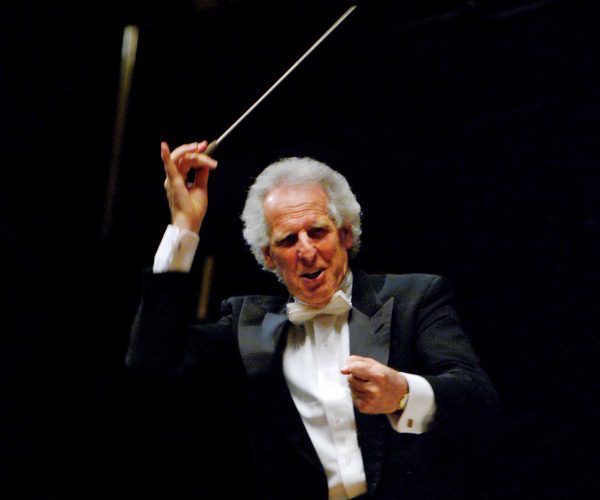Concert Review: The Boston Philharmonic Orchestra plays Wagner—Superbly
The biggest takeaway from the evening was the superb quality of the BPO’s playing: each of the orchestra’s readings were rhythmically alert, emotionally vivid, and glossed with high polish.

Boston Philharmonic Orchestra conductor Benjamin Zander in action. Photo: courtesy of the BPO.
By Jonathan Blumhofer
It’s one of the ironies of Richard Wagner’s creative genius that, in cities lacking major operatic resources, complete performances of his mature music dramas tend to be few and far between. So it is in Boston, even as we’ve recently heard Odyssey Opera’s impressive Rienzi (in 2013) and Boston Lyric Opera’s Der fliegende Holländer (in 2012). No, if you’re going to encounter, say, Götterdämmerung, Tristan und Isolde, or Die Meistersinger von Nürnburg around here, it’s probably going to be in a concert of familiar orchestral excerpts, with an aria or two thrown in for good measure. So it has been over the last few years, notably from the Boston Symphony and, this week, Benjamin Zander and the Boston Philharmonic Orchestra (BPO) take their turn with extracts from these operas. To judge from Wednesday night’s surging, powerful performance at Cambridge’s Sanders Theater, this is a series not to be missed.
The only real drawback to the program is its setting in such a cozy theater: Sanders’ smallish size prevented some of the biggest moments of some of these movements (like the soaring counterpoint of the Act 1 Meistersinger Prelude) from achieving full sonic flight and, on occasion, resulted in jumbled orchestral textures. (One subsequent performance, on Saturday night, is in the slightly larger—but still not Wagner-sized—Jordan Hall; Sunday’s finale returns to Sanders.)
On the flip side, in such close quarters there was a welcome immediacy and a physical force to much of the playing. Zander and his ensemble judged their balances smartly and, for the most part, adjusted their sound well. The opening Prelude to Act 3 of Die Meistersinger was marked by a spirit of nobility that simply enveloped you. In the Götterdämmerung excerpts, Ed Meltzer’s timpani strokes bridging “Siegfried’s Death” and “Siegfried’s Funeral March” packed an intimate focus that drew you into the drama in a very special way. In the latter, too, the power of the orchestra’s reading was visceral, its ferocious turns from lament for to memorialization of the Ring’s hero neatly epitomizing the spirit of sublime tragedy at the root of the 16-hour-long cycle.
Zander clearly has an affinity for this music, as his spoken introductions to each group of operatic selections attested. And he’s conveyed that passion to his combined forces. The biggest takeaway from the evening was the superb quality of the BPO’s playing: each of the orchestra’s readings were rhythmically alert, emotionally vivid, and glossed with high polish.
Interpretively, there was something of an autumnal quality to much of the music making. The famous Prelude to Act 1 of Tristan und Isolde transpired in no real hurry, the long unfurling of the melodic line Zander’s musical focus. The last came across with velvety warmth and, if there might have been greater sensuous intensity to the big climax, you at least knew that this reading was tapping some genuine passions: Wagner’s ideal of love as experienced through the filter of a long life.
The Meistersinger selections also carried with them not inconsiderable weight and humanity. The Dance of the Apprentices and Act 1 Prelude came over with a certain whimsy and stolid humor, but never at the expense of the lyricism and color at the heart of Wagner’s writing. Indeed, the sweep of the BPO’s account of the “Prize Song” in the latter was as compelling as the glockenspiel solos in the former were charming.
After intermission, Zander and the BPO turned to five excerpts from Götterdämmerung: “Dawn,” “Siegfried’s Rhine Journey,” “Siegfried’s Death,” “Siegfried’s Funeral March,” and the Immolation Scene. In these movements, especially, the BPO played with clarity and fervor. “Dawn” emerged with striking focus and sensitivity, the “Rhine Journey” billowed majestically, and the “Funeral March” seethed. In the big orchestral coda to the Immolation Scene, Zander drew forth playing that ably realized the scope of the drama the music depicts, rich with color and assured character.
Soprano Alwyn Mellor, who this past spring appeared with the Boston Philharmonic Youth Orchestra in Act III of Siegfried, left a strong impression in the vocal portion of the latter, singing with dark tone and commanding presence. There were moments in which her sound was covered in its lower register, but the evenness of her projection in the middle and upper parts of her range and her obvious understanding of the role carried the day.
Much the same can be said of her Liebestod at the end of the concert’s first half. Again singing with tonal warmth and immaculate diction, Mellor captured much of the aria’s delicacy and rapture. In this, she was matched step-for-step by the BPO’s lustrously-actualized accompaniment.
Jonathan Blumhofer is a composer and violist who has been active in the greater Boston area since 2004. His music has received numerous awards and been performed by various ensembles, including the American Composers Orchestra, Kiev Philharmonic, Camerata Chicago, Xanthos Ensemble, and Juventas New Music Group. Since receiving his doctorate from Boston University in 2010, Jon has taught at Clark University, Worcester Polytechnic Institute, and online for the University of Phoenix, in addition to writing music criticism for the Worcester Telegram & Gazette.
Tagged: Benjamin-Zander, Boston Philharmonic Orchestra
